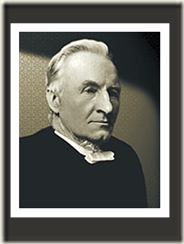 Alexander Whyte was born in January of 1836 in a small town in Scotland. He was raised by his mother—as his father abandoned he and his mother when he was still a baby. Growing up to a single mother Whyte did not have the finances to afford an education. This did not stop him as he taught himself to read.
Alexander Whyte was born in January of 1836 in a small town in Scotland. He was raised by his mother—as his father abandoned he and his mother when he was still a baby. Growing up to a single mother Whyte did not have the finances to afford an education. This did not stop him as he taught himself to read.
Fortunately for Alexander his abilities were discovered and a kind minister taught him Latin and Greek so he could attend university. He eventually was educated at Aberdeen University and the Free Church College in Edinburgh, but not before having to seek out his biological father. Young Alexander had to ask his father—now a wealthy businessman—for the resources to attend university.
Alexander Whyte died quietly in his sleep at the age of 85.
Why You Should Know Him:
Though Whyte looks like he played a scary butler from a 1960’s Hitchcock film his value to the church is far greater than a supporting role in a horror flick. Within his eighty-five years Whyte pastored the largest church in Scotland and was also a college president. He was known as a tremendous orator with vivid illustrations that were saturated with gospel truths. Whyte was also responsible for introducing D.L. Moody and Ira Sankey to the people of Scotland. Whyte also wrote many books and biographies.
What originally drew me to Andrew Whyte were quotes from his preaching and sections from his biographies. He proved to be a faithful biographer of many God-besotted men. He was also a tremendous preacher himself.
Samples:
Whyte was very passionate about the importance of wrestling with God in prayer. Consider this quote:
Take good care that you are not spiritual overmuch in the matter of prayer. Take good care lest you take your salvation far too softly, and far too cheaply. If you find your life of prayer to be always so short, and so easy, and so spiritual, as to be without cost and strain and sweat to you, you may depend upon it, you are not yet begun to pray. As sure as you sit there, and I stand here, it is just in this matter of time in prayer that so many of us are making shipwreck of our own souls, and of the souls of others.
I also found this quite helpful from Barbour’s Life of Alexander Whyte:
As he had his own heart warmed by Christ, so he singed others. He learned about human character from delving deep into the recesses of his own “desperately wicked” heart. Strict self-examination and self-knowledge were a major part of his own life and teaching. What he himself had experienced was a basis for what he then taught others. He related to his people the terrors and the glories at which his own heart had trembled or rejoiced. Nobody ever heard from his lips any cold truth. He was not detached from the truth he preached. His fiercest accusations were always against himself. When he was speaking in a slum where its inhabitants were known for their drinking he astonished his hearers by informing them that he had found out the name of the wickedest man in Edinburgh, and he had come to tell them; and bending forward he whispered: “His name is Alexander Whyte.”
Further Study:
Barbour’s Life of Alexander Whyte is very interesting and about the only at length biography of Whyte that I know of. Buy it here.
Dr. Michael Haykin has put together a nice collection of snippets from the works of Whyte. A Consuming Fire: The Piety of Alexander Whyte.
You can access one of his books, “Lord Teach Us to Pray” for free at CCEL.
If you do a search on Google Books for Alexander Whyte you will find several free offerings.